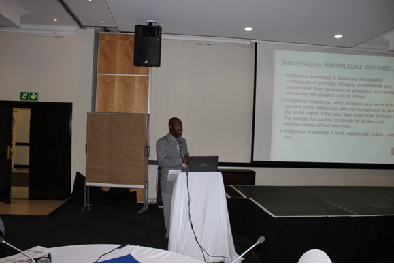He noted that indigenous knowledge is developed and adapted continuously to gradually changing environments and passed down from generation to generation and is closely interwoven with people’s cultural values. Indigenous knowledge belongs to peoples from specific places with common cultural and social ties. Such form of knowledge addresses local problems and solutions that are context specific. He further added that indigenous knowledge is evolved through a nexus and adopts the nexus approach in its application.
There was a general consensus that weather was increasingly becoming more and more difficult to predict and seasons were now predominantly characterized by late onset of rains, poor rainfall distribution, frequent storms, hail and drought within the same season and uncharacteristically long dry spells.
In his presentation, Qandelihle also noted that rural communities have over decades, relied on indigenous methods for forecasting the seasons and coping with numerous weather-related stressors. For example, one of the short term weather predictions is that when the wind blows from the land it is believed it is the husband going to the sea to meet the wife and the result is the rain.
A call to the RBOs was made to promote a multi sectoral approach to climate change adaptation, to sensitize RBOs on indigenous community leadership, knowledge and practices, to document and disseminate local indigenous knowledge and practices for forecasting, to introduce indigenous knowledge and practices into the school curriculum, institutionalise, promote and commercialise Indigenous Knowledge & Practices, protect ecologically sensitive sites. He further noted that there is a need to develop and strengthen functional linkages with the agriculture sector as well as indigenous community leadership and also to consider combining LIKSP with conventional scientific forecasts so as to contribute to the building of more robust mitigation and adaptation measures.
In 2013, Global Water Partnership Southern Africa (GWPSA) was contracted to undertake three (3) country based studies in 14 SADC countries on behalf of SADC and GiZ. Three regional collated studies were undertaken on water financing and investment, regional water policy and local indigenous knowledge systems on water security and climate change.
The completion of these studies has come with the need for repacking the studies into various knowledge products and to share the results of the studies to various stakeholders in various forums that will see to the implementation of the 3 components of the SADC-GIZ-GWPSA project focused on harnessing knowledge to build climate resilience and achieve water security, sharing that knowledge and developing stakeholder capacity and involving decision makers to ensuring increased water investments – through integrated approaches that aim to invest in information, institutions and infrastructure.
